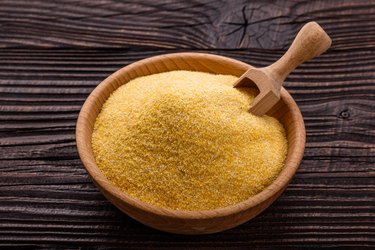
If you follow a gluten-free diet, any product with wheat, barley or rye is off-limits. Cornmeal is made from dried corn kernels, and thus contains none of these ingredients.
You can buy cornmeal in fine, medium or course grinds and use it for a variety of purposes, from making a pudding-like side dish called polenta to baking breads and muffins.
Video of the Day
Video of the Day
Celiac Disease and Gluten Intolerance
Consuming foods containing gluten causes health issues for those intolerant of gluten or those who have celiac disease, a genetic autoimmune disorder. Gluten can in wheat, barley and rye cause short-term and immediate adverse effects, including bloating, diarrhea and constipation. Consuming gluten might also cause skin rashes, weakness, depression and tingling.
Left untreated, celiac disease may develop into cancer, osteoporosis or other autoimmune conditions. The single treatment for celiac disease or gluten intolerance is a gluten-free diet. Any trace of gluten, from a crumb up to an entire slice of bread, can make symptoms return.
Cross-Contamination
Cornmeal is considered a gluten-free product, but is often produced by manufacturers who also process wheat on their machinery. Check labels on the package you purchase to see if it's noted that the cornmeal is processed on equipment with wheat. Because even the smallest amount of gluten taints your diet, you should purchase cornmeal labeled as gluten-free.
Baked Goods
Although cornmeal is gluten-free, it doesn't mean all cornbread and corn muffins are as well. Most recipes for these breads combine cornmeal with wheat flour to produce bread with a finer texture.
Unless the bread is explicitly labeled as gluten-free, you cannot be sure it will fit into your eating plan. Experiment with combining gluten-free cornmeal with other gluten-free baking ingredients — such as rice, almond or coconut flour — to enjoy wheat- and gluten-free versions of the foods you love.
Preparations
If you purchase course-ground corn meal that you're confident is gluten-free, you can make polenta as an alternative side dish.
Simply boil the cornmeal in water or broth until thick and soft to the palate — add cheese, herbs and spices to your taste and serve alongside roasted meats, marinara sauce or sautéed mushrooms.
For gluten-free muffins and cornbread, look for recipes that use sorghum or brown rice flour combined with cornmeal and xanthan gum, a natural gluten-free binder.
Related Reading